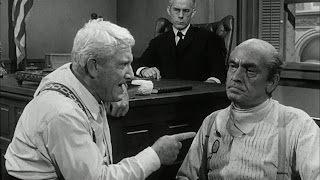Sunday, February 4, 2018
Post 1, Group B - Inherit the Wind (1960); The Fear of Change by Kenneth Butcher
The movie I chose to look at for this assignment was Inherit the Wind. A film I was introduced to in my Anchor class last semester based on a play of the same name that I found pretty interesting. The plot is a fictionalized recounting of a real-life court case in 1925, where two renowned lawyers argue the case for and against a science teacher accused of the crime of teaching evolution in his classroom. The ideas of the proliferation of fear can be found almost everywhere in this film, but I specifically want to talk out the flim's take on the fear of change by looking at the ways the characters in the story respond to having their fundamental beliefs challenged.
There’s a scene towards the beginning of the film where Spencer Tracy’s character Henry Drummond (the lawyer arguing on the behalf of the teacher who was jailed for teaching evolution in school) is walking into the town to speak with his client and Fredric March character Matthew Harrison Brady (the other lawyer as well as the towns pastor) organizes his congregation to hold a parade for him as he rides to the courthouse. Something I interpreted as sort of a demonstration of sorts, once conceived with the intent of getting two messages across; the fist being that the town was predominantly comprised of unapologetic, fundamentalist Christians. And the second being that that aforementioned demographic was going to adamantly stand against Drummond in court on the grounds that any challenge to their core beliefs and traditionalist methods of teaching (in this case the rationalization of the teaching of Darwin's theory of evolution in schools) was direct affront to god and would be meat with fervent push back. I believe that this is highly indicative of a homogeneous state that has become so accustomed to life within the confines of their society for better or for worse, the live in fear of anything that poses any sort of challenge to that pre established normalcy. Thus they have to in a way constantly be on the defensive about their beliefs (hence the preemptive parade/demonstration against a lawyer they never met, entirely on the basis of what he represented)
That being said those are just the outward signifiers of a fear of change or being challenged. I think the more insidious aspects of the effects of this fear can be seen more heavily in the way Brady and members of his congregation speak and behave. As well as the rhetorical devices they use when they debate. As the trial continues one starts to notice a pattern in the way Brady behaves whenever Drummond want to make a point that might cause him to question one of his long standing beliefs or call someone who might be able to say something to incite the same effect; automatic dismissal. Brady (and subsequently the members of his congregation) would proceed to laugh off and or purposely misinterpret every point or more secular joke Drummond would make in lieu of actually addressing it. These scenes are played as comedic but I think they’re very indicative a strong adverseness to change and I think one of the exchanges that most exemplifies this is this one:
Subscribe to:
Post Comments (Atom)
Resubmissios Essay
Throughout this essay I will be discussing the skills that I need to work on with it being personal skills and skills that pert...
-
The Pirates of the Caribbean: The Curse of the Black Pearl was the first of a now popular series. It romanticized pirates' legend...
-
We have a lot of Modern social issues in society that need to be overcome. Drugs, violence and peer pressure are extreme concepts that...
-
The 2008 Marvel movie IRONMAN is a movie about a brilliant American industrialist Tony Starks, performed by actor Robert Downy Jr, who ...





This is a really interesting take. We usually conceptualize fear as being born of a physical threat or emotional state. I like that you're confronting the idea of fear from the angle of change to one's understanding of the world around them. That can be the most palpable, threatening fear for certain people. We get very tethered to belief systems and dependence on them.
ReplyDeleteThis comment has been removed by the author.
DeletePlease let me know who wrote this.
DeleteI wish you would have told us more about what you thought about the show and put a little more interest into what you had to say. What on earth do you mean to have the section of movie dialogue tell us? are we to simple shake our heads and say "yes, I see what you mean there" when inside we actually are assuming our own thoughts are yours and vice versa for you?!? I really would like to know more about how you think the fear shows it's self in how the towns people react and why does their belief matter so much to this issue. I understand you were in a time crunch to produce this piece / you did not care, but understand and remember that the rest of us have to read and respond to what you had to say and it is so much more enjoyable for all of us if you give it some thought.
ReplyDelete